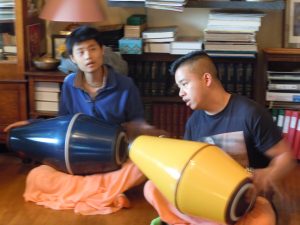![]()
After fulfilling his responsibility to produce a nice child, one should take sannyāsa and engage in the perfectional paramahaṁsa stage. Paramahaṁsa refers to the most highly elevated perfectional stage of life. There are four stages within sannyāsa life, and paramahaṁsa is the highest order. The Śrīmad Bhāgavatam is called the Paramahaṁsa-saṁhitā, the treatise for the highest class of human beings. The paramahaṁsa is free from envy. In other stages, even in the householder stage of life, there is competition and envy, but since the activities of the human being in the paramahaṁsa stage are completely engaged in Kṛṣṇa consciousness, or devotional service, there is no scope for envy. In the same order as Kardama Muni, about one hundred years ago, Ṭhākura Bhaktivinoda also wanted to beget a child who could preach the philosophy and teaching of Lord Caitanya to the fullest extent. By his prayers to the Lord he had as his child Bhaktisiddhānta Sarasvatī Gosvāmī Mahārāja, who at the present moment is preaching the philosophy of Lord Caitanya throughout the entire world through his bona fide disciples.Lectures : Srimad-Bhagavatam Lectures : Canto 3: Lectures : SB 3.22: Lectures : Srimad-Bhagavatam 3.22.19 — Tehran, August 8, 1976 : 760808SB.TEH :
If you prosecute the path of karma, there is envy between the karmīs. If you become greater than me in execution of your fruitive activities, I become envious of you: “Oh, this man is making so much progress in business or in some other way, in practice. I could not do.” So I become envious. Similarly, if I advance, my friend becomes envious. So karma-mārga is the path of enviousness. Therefore Śrīmad-Bhāgavata says paramo nirmatsarāṇām [SB 1.1.2]. The Bhāgavata is meant for persons who are absolutely free from enviousness. Lectures : Srimad-Bhagavatam Lectures : Canto 6: Lectures : SB 6.1: Lectures : Srimad-Bhagavatam 6.1.14 — Bombay, November 10, 1970 : 701110SB.BOM : \ Because in the material world, everyone is envious of another person. That is the nature. Therefore there is so much fight. Everyone is envious. Nation is another nation’s against, envious, even person to person, brother to brother, family to family, community to community. Everywhere, matsarata. Para-utkarṣaṇam asahanam (indistinct). Matsarata means one cannot tolerate other’s flourishing condition. Immediately envious. But this system, Kṛṣṇa consciousness, is meant for paramo nirmatsarāṇām. One who has learned this art not to become envious. Tolerant. That is the qualification of saintly persons. Kind. Tin… Hm? What is that? Titikṣavaḥ kāruṇikaḥ. Those who are preachers, they should be titikṣava. Titikṣava means titikṣa, tolerance. There will be so much insult, inconveniences, against party, everything. We have to tolerate. Titikṣavaḥ kāruṇa. At the same time, we have to distribute the mercy of Caitanya Mahāprabhu. Titikṣavaḥ kāruṇikaḥ. Suhṛdaḥ sarva-bhūtānām, and friend of everyone, there is no distinction. Friend of everyone. Ajāta-śatravaḥ. By their action they’ll not create any enemy. Ajāta-śatravaḥ santaḥ, peaceful. Ajāta-śatravaḥ santaḥ sādhavaḥ sādhu-bhūṣaṇāḥ. These are the decoration of sādhus, saintly persons. Titikṣavaḥ kāruṇikaḥ. I think this śloka is there in the Kapila’s teaching to His mother. Titikṣavaḥ kāruṇikaḥ, ajāta-śatravaḥ santaḥ, sādhavaḥ sādhu-bhūṣaṇā [SB 3.25.21].Lectures : Srimad-Bhagavatam Lectures : Canto 6: Lectures : SB 6.1: Lectures : Srimad-Bhagavatam 6.1.47 — Detroit, June 13, 1976 : 760613SB.DET :
![]()



